- Home
- Martin Amis
The Moronic Inferno and Other Visits to America Page 6
The Moronic Inferno and Other Visits to America Read online
Page 6
It quickly becomes clear — does it not? — that Goldman isn't to be trusted. In his palpable eagerness to explode the Presley Myth, he has erected an anti-myth to replace it — which, in turn, is already being whittled away at by transatlantic commentators. It may indeed be the case that Elvis was no more than a horrible, and horribly uncomplicated, embodiment of American Success; but Elvis leaves us none the wiser.
In biography, displays of such inordinate aggression leave one wondering about the personal problems of the author rather than the subject. I read Elf is under the impression that Goldman was a surly young iconoclast of the Rolling Stone school of New Journalism. On the back flap I am confronted by a middle-aged chipmunk who used to be Professor of English and Comparative Literature at Columbia. As should by now be evident, the book is a prodigy of bad writing, excitable, sarcastic and barely literate. It is also as exploitative as the exploiters whom Goldman reviles, and no more tasteful than a Presley pants-suit.
Observer 1981
Diana Trilling at Claremont Avenue
In New York, Diana Trilling is regarded with die suspicious awe customarily reserved for the city's senior literary ladies. Whenever I announced my intention of going along to interview her, people looked at me with trepidation, a new respect, a certain holy dread. I felt I was about to enter the lion's den — or the den of the literary lioness, which is often just as dangerous.
I had tangled with Mrs Trilling before, more than ten years ago, and had my own reasons for fearing her well-known asperity. Mr and Mrs Lionel Trilling were on a visit to London at the time, and, knowing of my admiration for Mr Trilling's work, a common friend had arranged a meeting: tea at the Connaught, the London hotel where all distinguished Americans seem to put up. I remember Lionel as milky-haired, laconic and serene; I remember Diana as dark, foxy and fierce. At one point I made an incautious remark, illiberal in tendency — an undergraduate remark. Mrs Trilling cracked her teacup into its saucer and said: 'Do you really mean that? Then what are we doing here? Why are we sitting here having tea with this person?’
Diana Trilling lives in Claremont Avenue, near Columbia University, where her husband taught: he was the first Jew to gain tenure there, incredible as that now seems. American cities appear to have a habit of surrounding their seats of learning with slums. In the foreword to her first collection of articles, Claremont Essays (1964), Mrs Trilling wrote about the exact sense of urban positioning that Columbia affords. The community is perched on its grassy hill, a fortress of intellection, with boiling Harlem just down the slope.
On the telephone Mrs Trilling had given me carefully, indeed grimly detailed instructions for the subway. One false move, I gathered, and I would find myself clambering out of a manhole on Duke Ellington Boulevard. In the end I took a cab — through the Upper West Side, along bending Broadway for the lawless Nineties, and up into the beleaguered castle of the University, and Claremont Avenue, a wide clean street with the solid, civic feel of old New York. Punctual to the second, I warily pressed the bell. Now, perhaps, the real perils would begin.
Mrs Trilling received me in her ground-floor apartment. I liked her immediately — actually, I had liked her the first time — and knew , that I was going to enjoy the afternoon. However, I quickly re-identified the kind of unease that a woman like Diana Trilling is always liable to provoke. You have to watch what you say when she's around. I mean this in the best sense. Mrs Trilling is not touchy or snobbish or over-sensitive; she is just intellectually vigilant, snake-eyed. In her company you are obliged to move up a gear — you must weed out your lazier, sloppier thoughts (like the one that had briefly incensed her in the Connaught). No, she isn't the most soothing of companions; but you end up chastened and braced, and there is much laughter and enlightenment to be had on the way.
The life of the American intellectual is qualitatively different from its British equivalent. In America, intellectuals are public figures (whereas over here they are taken rather less seriously than ordinary citizens — at most, they are licensed loudmouths). The intellectual life therefore has a dimension of political responsibility; the crises of modern liberalism — the race question, McCarthyism, feminism, Vietnam, Israel - are magnified but also taken personally, vitally. Spats between writers are transformed, willy-nilly, into unshirkable crusades. The Trillings lived this life together and experienced all its triumphs and wounds. Lillian Hellman, Martha's Vineyard, 1952, 1968, Little Brown, UnAmerican Activities, the New York Review ... it is a ceaseless, swirling litany. These hatchets may look pretty rusty to the outsider, but they will never be buried. And maybe the positions are more fiercely held now that they are held alone.
It is all the more unexpected, then, that Diana Trilling suddenly finds herself the author of a bestseîling book about a tabloid homicide. The murder of Herman Tarnower and the trial of his mistress Jean Harris electrified America in a way that (I suspect) will never be fully comprehensible to the British public. It is hard work trying to dream up a home-grown equivalent of the crime - as if, say, the headmistress of Roedean had done away with Jimmy Saville. Diana Trilling's original title, vetoed for legal reasons, was 'A Respectable Murder', which is doubly appropriate. To the public, the murder was all about class, and in America class tends to shade into race: Mrs Harris was a high-class Wasp, 'Hi' Tarnower a vulgar diet doc, a Jewish counter-jumper. And, as a rejected mistress, one spurned for a younger replacement, Mrs Harris's case seemed to dramatise the universal female fear. It wasn't just a respectable murder; it seemed, at first, almost to be a justifiable one.
But the most extraordinary thing about Mrs Harris is its energy. Not until later did I discover Mrs Trilling's true age: I had thought she was ten years younger, and even then I was astonished by the stamina that had gone into the book. Every day Mrs Trilling would drive out to the court-house (before the trial, also, she did a little investigative work in the Westchester suburbs, hampered by bad weather, lack of co-operation, and by her own reluctance to pry into other people's lives). After a day of scandal and/or back-breaking boredom in court, she would drive back to Claremont Avenue, and start to write. 'I was working fifteen hours a day for three-and-a-half months,' says Diana Trilling, who, it transpires, is now in her mid-seventies.
The energy of the book, however, is not only a matter of endurance. After its slowish start, Mrs Harris builds into an intricate compendium of wit, social grasp, clarity of thought and novelistic brio. Diana Trilling's essays and articles were never dull, but here she is revealed as a writer with an infallible eye for the interesting. And now it seems that we can look forward to an extended period of productivity — facilitated, perhaps, by the condition of widowhood. 'When Lionel was alive, we tended to do what he wanted to do. Now there's nothing else to do but work.' Literary widowhood often means a long spell of literary executorship, and Mrs Trilling has duly completed her editing of the twelve-volume Uniform Edition of the Works of Lionel Trilling. She is now engaged on a book about her early life. It is possible, too, that she has in some sense emerged from her husband s shadow, and feels a new freedom and confidence.
'Growing old is hard. Growing old alone is harder,' she said. 'You become more sensitive with your friends. You wonder whether you are being asked out because of pity. There is an increased dependence on routine. I won't leave the bed unmade in the morning. I won't stand by the refrigerator and eat a boiled egg. I want to, but I don't.' She talks of her husband without self-drama but with palpable regret. 'I feel the usual things ... I wish now that I had worshipped him a bit more.’
The apartment in Claremont Avenue is as elegant and well-preserved as its owner. Everywhere there are books, framed photographs, mementoes. 'The individual is best defined by his social geography,' wrote Diana Trilling in We Must March My Darlings (1977). Lionel Trilling wrote about society but normally only in relation to literature, or culture: he was also a critic with certain bold mytholo-gising tendencies, with a love for the exciting idea, the daring construct. 'Yes,' said Dian
a Trilling, with some self-deprecation, 'I was always the one more interested in the social side, in the here and now.' 'But there aren't many people like you,' I said cautiously. 'You're a clear thinker.' 'That's right. Too clear, perhaps,' said Mrs Trilling.
Observer 1982
Mailer: The Avenger and the Bitch
The year was 1955. At thirty-two, Norman Mailer was the celebrated and reviled author of three novels, and a notorious brawler, sage and drunk. By his own admission, he was at this point arrogant, terrified, greedy, spoilt — and galvanised on marijuana.
q. Do you feel that age will mould you into a high-priced please-the-public author?
A. I doubt it, but I also know that exhaustion of the will can come to anyone.
It would be tempting, here in 1981, to pounce on the young Mailer's stoned foreboding. His latest money-spinner, Of Women and Their Elegance, has taken a pummelling from the American press and is due for a torrid time of it over here. With its terrible title (that 'OP somehow guaranteeing the vulgarity of the enterprise), its irrelevant photographs and coffee-table packaging, the volume seems to boast its own vulnerability to attack. As you flap through its slippery pages, you find that it is Mailer's second book about Marilyn Monroe, and his third book running about the recently dead and their sex lives (its immediate predecessor was The Executioner's Song, the story of the murderer Gary Gilmore, who demanded death by firing squad in 1977). What happened to the man who has said — loud and often — that he hoped 'to dare a new art of the brave'? Clearly it is time for some revision of Mailer's American dream.
Now, at fifty-seven, Mailer has accumulated six wives and eight (or maybe nine) children. He is obliged to earn over $400,000 a year to stay abreast of alimony and tuition fees. Last year his summer house was confiscated by the taxmen. He has received, and spent, a $635,000 advance on an unwritten novel. And he is still half a million dollars in debt.
In his three-storey brownstone apartment in Brooklyn Heights, overlooking New York Harbor and the Dunhill lighters of Manhattan, Mailer perched on a stiff-backed chair, and told me to sit on the old velvet sofa. 'I can "t sit on a soft chair. I writhe around a lot. Hurts my back,' he said with an apologetic wince.
The battered but comfortable apartment feels like a ship. A pulley system leads to the upper floors. Mailer used to have a crow's-nest office at the top; the once-vigorous author would clamber up a rope to begin the day's work. Now he goes to a rented office down the street, trudging back for lunch. Children of alarmingly various ages had gathered for their supper in the dining area. Mailer's sixth wife, the dark-eyed model and actress Norris Church ('she's half my age and twice my height'), sat imposingly near by, reading a buxom magazine.
His face is more delicate and less pugnacious than you would expect, the body more rounded, dapper and diminutive. The tangled hair is white but plentiful, the frequent smile knowing but unreserved. Despite his long history of exhibitionism, he no longer enjoys giving interviews. You can sense him wondering how much of his charm he will need to disclose.
Mailer watched wistfully as I feasted on my drink. 'It's the terrible price you have .to pay,' he said, referring to his own eight-month abstinence. 'The day just wasn't long enough, and I have to work so hard now, to make the money. My nerves have been pretty well encrusted by booze, thank God. It's okay. It just means there's nothing to look forward to at the end of the day.’
'Thanks a lot,' said Norris. 'What about me?’
'No, the sex is great. The fucking's great. I just miss it, that's all.’
This reminded me of another sacrifice Mailer has been forced to make. He has always argued that any act of sex is invalid, corrupt, soul-endangering, etc., if the chance of conception has been ruled out. 'I've got eight kids,' said Mailer. 'I can't afford to believe that any more — My hopes and expectations have changed. I no longer feel prepared to go to the wall for any big ideas.’
'Have you mellowed', I asked cautiously,'- or what?’
'Not really. Let's say I've adjusted to circumstances. At last.’
Well, it has been a long haul. This is the man - and here headlines and half-impressions flash past - who stabbed his wife, who ran for mayor, who butted Gore Vidal, who 'won the election for Kennedy', who went on TV in his boxing trunks, who told novelist Alan Lelchuck that when he got through with him 'there'd be nothing left but a hank of hair and some fillings'.
This is the Existential Hero, the Philosopher of Hip, the Chauvinist Pig, the Psychic Investigator, the Prisoner of Sex. For thirty years Mailer has been the cosseted superbrat of American letters. It has taken him quite a while to grow up. But the process has made for a fascinating spettacle.
'Early success — that was the worst damn thing that could have happened to me.' A bright Jewish boy from Brooklyn, a Harvard graduate, Norman went off to fight as a rifleman in the Philippines. Showing that mixture of recklessness and calculation which marks his entire career, Mailer had the express intention of gathering material for the Great American Novel of the Second World War. A brave but clumsy soldier, he survived his few skirmishes, came back to Brooklyn, and wrote The Naked and the Dead. He was twenty-four.
Before publication Mailer left for France with his first wife Beatrice. Calling in at the American Express office in Nice, Mailer was handed what amounted to a swag bag of money and fame. American express! Number-one bestseller, sobbing reviews, forty translation rights sold, Norman, get back here! That 'meant farewell', Mailer would write in Advertisements for Myself (1959), 'to an average man's experience'.
Early acclaim won't harm a writer if he has the strength, or the cynicism, not to believe in that acclaim. But Norman lapped it up, and is perhaps only now recovering from the deception. True, he was very young, the success was very great — and the book was very good. Reading The Naked and the Dead today, one is astounded by Mailer's precocious sense of human variety, by the way he goes a step further into the extremities of exhaustion, yearning and terror, and, above all, by his ability to listen intensely to the ordinary voices of America. The novel was impossibly adult: the immaturity was all to come.
It is hard to imagine the kind of freedom that was suddenly Mailer's. After an equivalent success, an English writer might warily give up his job as a schoolmaster, or buy a couple of filing cabinets.
But Mailer had the whole of America to play with. Flattered and lionised, he bummed around Hollywood failing to write a screenplay, lived it up a good deal, and discovered a further perk of literary fame: 'getting girls I would never otherwise have gotten'. 'I was a node in a new electronic landscape of celebrity, personality and status.' The only trouble was that he had nothing left to write about.
The reception of Mailer's second novel, Barbary Shore (1951), was hysterical too, but the nature of the hysteria had changed. 'It is relatively rare to discover a novel', wrote one of the more temperate reviewers, 'whose obvious intention is to debauch as many readers as possible, mentally, morally, physically and politically.' A murky, paceless tale of spies and subversives, predators and impotents, the new novel had little of the style and control of The Naked and the Dead. The prose gurgles with cliches, tautologies and uneasy mandarinisms. What offended the critics, of course, was the book's supposedly socialist message. What offends the present-day reader is the book's message, period.
The truth is that in the vacuum of success Mailer had fallen prey to the novelist's fatal disease: ideas. His naïveté about 'answers', 'the big illumination', 'the secret of everything' persists to this day. An admirer of Malraux and the equally humourless Jean Malaquais, Mailer dubbed Barbary Shore the 'first of the existentialist novels in America' and himself 'a Marxian anarchist' — 'a contradiction in terms, but a not unprofitable contradiction for trying to do some original thinking'. It is all too easy, though not very profitable, to imagine Mailer at this time, sitting around doing lots of original thinking. His thraldom to catchpenny shamanism had begun. Oh well, existentialism (so far as I can gather from Mailer's writing on the topic
) means never having to say you're sorry.
Over the next few years Mailer underwent a kind of aesthetic nervous breakdown. The reverse he suffered over Barbary Shore released a primal scream of rage and hurt; it also wrecked his artistic confidence. The resulting combination of Big Ideas and naked desperation proved crucial to Mailer's psychology. In a deep haze of illness, depression and drink, Mailer gouged out The Deer Park (1955). It was turned down by seven publishers.
Against the grain as always, Mailer had this time fallen foul of the obscenity laws. Or so the publishers feared — or so they claimed they feared. Mailer raged against the 'snobs, snots and fools' of the literary establishment but refused - at first - to tone down his mannered portrait of Hollywood amorality. When the novel was finally accepted Mailer took another look at the page proofs, intending no lawyer's deletions but 'just a few touches for style'.
By this stage Mailer was 'bombed and sapped and charged and stoned with lush, with benny, saggy, Milltown, coffee, and two packs a day'. His artistic nerve began to jangle with his commercial sense. 'I needed a success and I needed it badly ... The Deer Park had damn well better make it,' wrote Mailer in a startlingly candid passage in Advertisements for Myself. Shamefacedly, he started cleaning up some doubtful scenes. He wanted 'a powerful bestseller' but also wanted 'to save the book from being minor'.
Having rendered the book major (whew!), and even more powerful, Mailer waited anxiously for publication. On a mescaline trip, he rewrote the last six lines. Confident for a while, he lost his nerve again and sent out copies of the book to various bigwigs with fawning inscriptions ('if you do not answer,' he wrote to Hemingway, '... then fuck you, and I will never attempt to communicate with you again.' Hemingway didn't answer). The Deer Park was a 'half success', as indeed was its due, and not the 'breakthrough' for which Norman had pined. As a last gesture, he put together a full-page advertisement with choice quotes from the reviews: 'Disgusting. Nasty. Sordid and crummy. Junk.’

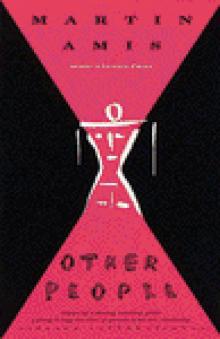 Other People
Other People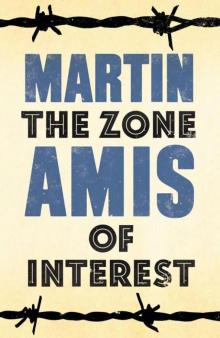 The Zone of Interest
The Zone of Interest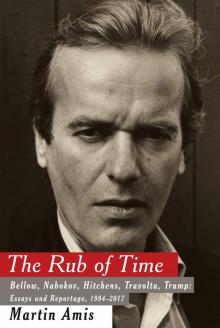 The Rub of Time: Bellow, Nabokov, Hitchens, Travolta, Trump
The Rub of Time: Bellow, Nabokov, Hitchens, Travolta, Trump Koba the Dread
Koba the Dread Success
Success London Fields
London Fields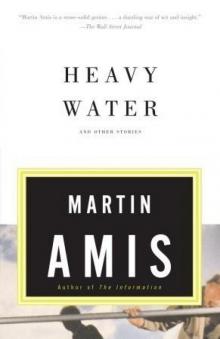 Heavy Water: And Other Stories
Heavy Water: And Other Stories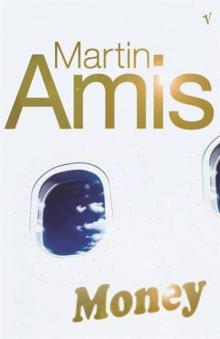 Money
Money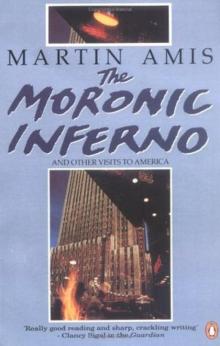 The Moronic Inferno and Other Visits to America
The Moronic Inferno and Other Visits to America Yellow Dog
Yellow Dog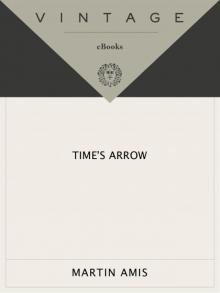 Time's Arrow
Time's Arrow Experience: A Memoir
Experience: A Memoir Einstein's Monsters
Einstein's Monsters The Pregnant Widow
The Pregnant Widow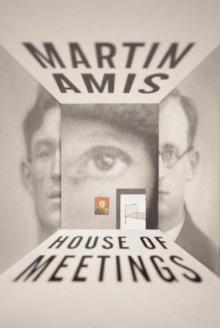 House of Meetings
House of Meetings The Information
The Information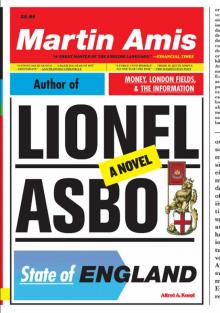 Lionel Asbo: State of England
Lionel Asbo: State of England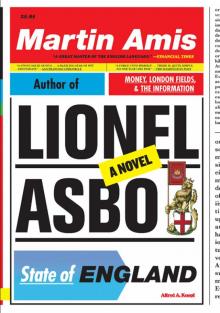 Lionel Asbo
Lionel Asbo Heavy Water and Other Stories
Heavy Water and Other Stories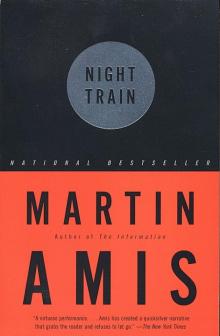 Night Train
Night Train Heavy Water
Heavy Water The War Against Cliche: Essays and Reviews 1971-2000 (Vintage International)
The War Against Cliche: Essays and Reviews 1971-2000 (Vintage International)